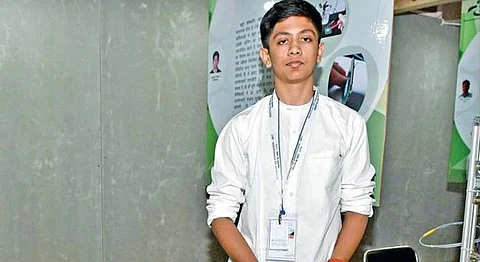
- HOMEGROWN WORLD
- #HGCREATORS
- #HGEXPLORE
- #HGVOICES
- #HGSHOP
- CAREERS
- ABOUT US
- CONTACT US

The Eureka effect is a term used to describe those inexplicable moments when an individual stumbles upon a sudden, smart insight. It comes to you through unlikely circumstances, ones that may hinder you, and force you to think outside the box; much like what Akash Manoj recently experienced. The 10th Grader from Tamil Nadu is out to change the lives of Indians with his recent ‘eureka moment’ that came in the form of a medical invention. Namely, a device that can detect silent heart attacks.
An avid reader of medical journals, the budding scientist’s invention was spurred on after the sudden death of his grandfather. He would constantly visit the library at the Indian Institute of Science in Bengaluru as he says, “Journal articles are expensive, so visiting libraries was the only way I could do it. Otherwise, it would have cost more than a crore (of rupees) for the amount I read. I was always interested in medical science and I liked reading the journals...cardiology is my favourite.”
A silent heart attack, proved to be the reason for his grandfather’s passing, and has also been noted to be a major health risk for several other Indians, as well. It isn’t easily detectable, as normal symptoms of a heart attack are not felt. The only way to detect it is through an electrocardiogram or an echocardiogram.
Now, Akash’s device helps an individual detect these silent attacks, through an unassuming small silicon patch stuck to your wrist, or the back of your ear. Using a positively charged electrical impulse, the patch draws negatively charged protein (released in event of a heart attack), to the surface. If the amount of FABP3 is high, that is an immediate indicator of a silent heart attack. People at risk are recommended to use it twice, daily.
In an exclusive interview with the Logical Indian, Akash Manoj mentions that in the future, he wishes to pursue cardiology from All India Institute of Medical Science (AIIMS) and then become a clinical researcher so he can work on more devices that’ll aid people. The Indian Government has recognized his achievements; Pranab Mukherjee, President of India, invited him to stay at the Rashtrapati Bhavan for two weeks, and gave him access to research facilities in India’s premier institutions: IIT Madras, AIIMS, to further develop his invention on a larger scale. If successful, the product will be seen soon in the market and will cost around INR 900.
